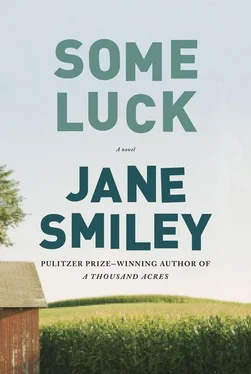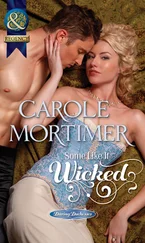“By the grace of God,” said Mama.
“Amen,” said everyone.
“Couldn’t have been more than nineteen or twenty, those boys,” said Papa. “Looked pretty hungry, too. If they’d asked Dan for a loaf of bread, he would’ve given it to them.”
“Lots of folks with nothing now,” said Granny Mary.
“Going to be more of those boys, I’ll bet, with everything that’s going on.”
“We just have to pray for mercy,” said Mama. Then she looked at Joe and put her finger to her lips. “Enough of that now,” she said. “Joe’s a big boy today.”
“Well, I’m not saying what that robbery, if you want to call it that, meant, but it was funny in the end. I guess those boys learned a bit of a lesson.”
Granny Mary said, “Didn’t they get arrested?”
“Who was going to arrest them?” said Papa. “No one around to do that. Dan got his money back and took away their guns. They went off pretty sheepish.”
Mama made that noise with her teeth, and Granny Mary shook her head, and then Grandpa Otto said that he had heard something on the radio.
“What was that?” said Papa.
“Turns out they found a new planet. You boys know what a planet is?”
Frankie said, “The Earth is a planet. And Mars. And Saturn. The planets go around the Sun.”
“Now there’s another one. Some fellows in Arizona found it, and they’re wondering what to name it.”
“I think it should have a girl’s name,” said Mama. “Only one planet has a girl’s name now.”
“That’s Venus,” said Frankie.
Joe wasn’t exactly sure what a planet was, but he knew what the Sun was. After supper, they ate the cake, and Joe got two shirts that Mama had made him, and Otto gave him a bag of cat’s-eye marbles, which Joe saw Frankie looking at more than once. Oma gave him some neatly wrapped molasses caramels with walnuts, and even though he had to share them around the room, everyone said, “Oh, thank you, Joey, but not tonight, I am just terribly full.” Only Opa took one. Once Opa, Oma, Granny, and Grandpa had left, and Mama and Papa had taken Lillian upstairs for bed, Frankie gave him a slingshot he had made from a branch of the Osage-orange hedge.
EASTER WAS LATE, as late as Walter ever remembered it — April 20—and the day after Easter, he started planting his corn. He didn’t like it one bit. After years of complaining that the fields were wet and he couldn’t get into them, or that the rain just came in fits and starts, so that every time he got his equipment ready he had to put it away again and keep stirring the seed corn so it wouldn’t get moldy (or would get less moldy), or that because of rain he had to replant some of the lower bits of the fields, this year he and Frankie had the wires strung in the first section before Easter, and the day after, instead of sending Frankie to school, they drilled the corn. The soil was fairly moist — that was the best you could say for it — and once he had worked for a while, Walter started to worry, not about the corn crop, but about the oat crop. The oats looked fine for now — a few inches high, and green — and Walter kept telling himself not to borrow trouble by worrying about it. But there was no wind. The air just stood there, and it seemed like it had been standing there for weeks. Jake and Elsa were sweating by the early afternoon, even though the work was slow.
Frankie said, “What’s wrong, Papa?”
Walter wiped his brow. “Not much. Nice day, huh?”
Frankie said, “When we’re done, can I go shoot frogs?”
“Down at the creek?”
Frankie nodded.
“I suppose so. Maybe I’ll come with you.” Walter hadn’t been down to the creek in two or three weeks, and he wanted to see how it was running.
But it wasn’t running very high, and there weren’t any frogs. No frogs was a bad sign.
Rosanna didn’t think much of his worries. She and Joey had two flocks of chickens now, fifty hens in each, and she was feeling rich, because a new café in town had made a deal with her and her alone to supply them with eggs and butter. The owner of the café, down from Milwaukee, Wisconsin, was a German man whose real love was pastry — he could make those old-country treats, schnecken and strudel and even baumkuchen, and he said that Rosanna’s eggs and butter were as good as any he’d seen in Bavaria. He expected the citizens of Usherton to storm his establishment once he had it going. Joey was good with both the hens and the eggs — he didn’t mind candling, which was a tedious business, and of course the hens seemed fond of him. Rosanna had gotten herself a new type of chicken from Canada called White Chanticleers. Walter thought they were a little picky, and they didn’t like to be confined, which meant that they were underfoot a good deal, but they had almost no combs or wattles, and were good outdoors even in winter, even when there was snow and ice. The best part about them was that you could mistake a roasted mature White Chanticleer for a small turkey — it would be that big. And the meat was tasty. Dan Crest was paying her four cents per egg, and the German man — his name was Bruno something, Bruno Krause — was paying her five and a half. Walter was delivering eggs every few days, four dozen, and three pounds of butter. So two good things — the corn planted after all, in spite of his worries, and a new source of income with this Krause fellow — and yet he lay awake looking for the worm in the apple, as his mother would have said. Rosanna was even talking about buying them a new bed — not a rope bed, but one with actual springs, so that they wouldn’t slide every night into the center and have to hoist themselves out. Walter turned over, and thought that if they got a new bed he would probably find something wrong about that, too.
LILLIAN WAS SITTING in her chair — she no longer used the high chair, because she was three and a half now, and good at sitting still, right where Mama had put her, and eating what was set in front of her. Or she was usually good at that; today, all she wanted was the tapioca pudding and the strawberries. Even though she was wearing only drawers and a loose smock, and had her hair tied out of her face, it was too hot to eat anything else. All the windows were open, and the dust hung in the air. Mama said, “Goodness me, praise the Lord, please give us just a bit of a breeze!”
Lillian yawned, and Mama said, “Well, you can have your nap on the sofa, darling. It’s roasting upstairs. I hope it cools off before bedtime; I didn’t sleep a wink last night.”
She came over, and Lillian held out her hands for Mama to wipe, and then Mama washed her face. The cloth was cool on her cheeks and forehead. Lillian yawned again. Mama picked her up and carried her into the front room. Lillian wandered over to the toy box and picked up Lolly, who was the cuddliest of her dolls, even though her hair had all come out, while Mama laid a sheet over the sofa, and then Mama took off Lillian’s shoes and socks and set them by the arm of the couch. Mama smoothed down her smock and took her hair out of its tie. When Lillian was lying quietly, Mama kissed her on the cheek and said, “Just an hour, while it’s so hot. Maybe it will cool off later.”
Lillian lay on her back with Lolly in her arms, looking up at the ceiling. It was dim at this end of the room, bright at the other end. Sometimes, the shadows of the trees outside quivered on the ceiling, but they only quivered. It was like looking into a pail of water and seeing the surface of the water move. Mama sat down and picked up her darning. She was doing some socks. Lillian heard the squeak of the rocking chair as it went back and forth, back and forth. One thing to think about was King Midas. Mama had read her that story only the day before, and when she came to the end, Lillian had cried, so Mama had said she would never read it again. The picture of King Midas that Mama had showed her looked regular — he had long hair, like Jesus, but also a crown. He looked nice. But he wanted a strange thing, which was for everything he touched to turn to gold. Lillian had seen that this was a bad idea from the beginning — all she had to do was touch her sausage, which was what they had for supper last night, in order to understand that having everything turn to gold at a touch would be horrible rather than wonderful. But King Midas persisted, then changed his very own child, who was a girl like Lillian, into a golden statue. And there was no turning back once it was done — Jesus did not show up to redeem King Midas, because, according to Mama, Jesus hadn’t been born yet. So that little girl, whatever her name was, was done for, and that was what made Lillian cry. Mama said, “Well, Midas learned his lesson,” and stroked Lillian’s hair until Lillian stopped crying, and the two of them prayed to Jesus that they might learn their lessons sooner rather than later, and that they would be gentle lessons rather than hard lessons. But Midas stuck in Lillian’s mind. Mama said, “Sweetheart, you have quite an imagination, I must say.”
Читать дальше












